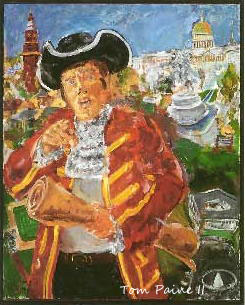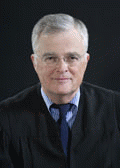(Article changed on February 21, 2013 at 06:12)
SAN FRANCICSCO, Feb. 21, 2013
-- On October 24, 2012, San Francisco District Court Judge William Alsup dismissed a suit
seeking findings of misrepresentation by the Treasury, re multi-billion dollar
reductions in the public debt, on the grounds that the government had a natural
"bully pulpit" right to lie.
This week the plaintiff, Dr. Clifford
Johnson, filed an appeal brief in the Ninth Circuit, arguing strongly against
this "unprecedented extension of government speech doctrine," and urging the development of a limiting "government deception doctrine." Johnson
v. United States Department of the Treasury, No. 12-16775. The government's response is due March 21.
At issue are estimates of the
benefit that would accrue to the government if all Federal Reserve $1 bills were
replaced with $1 United States coins. Last
year, this "coin-swap" was proposed in Senate bill S. 2049. It died in committee.
Johnson, a petitioner for the
coin-swap, alleges that the Treasury is complicit in grossly understating the reduction
to the public debt that would automatically result from the coin-swap. Assuming the same coin issue and bill
retirement schedules as the Government Accountability Office (GAO), Johnson
alleges:
"[The Treasury-mentored] 2011
GAO report estimates initial losses
for four years, and a net benefit after 30 years of only $5.6 billion, if
that. In fact, the government would also
benefit from: (a) an early gain of
$13.75 billion; (b) a further gain in excess of $30 billion from coins added
over the 30 years; and (c) a further $14.5 billion gain from 81.5% of the
interest relief per note replaced by a coin.
Hence, the net government benefit after 30 years would exceed $58
billion."
Johnson claims that this "matter
of accounting fact" falsehood was intended to and obviously does impair his
First Amendment right to petition for the coin-swap. He alleges that his message as to the correct
amount by which the public debt would be reduced is drowned out by the
government's authoritatively published falsified amount, which everyone else -- both
for and against the coin-swap --adopts as objective. A footnote in Johnson's brief underscores
this, and gives grounds for adding the GAO as a joint defendant:
"On remand, Johnson would add
a November, 2012 GAO coin-swap report and hearing. The farcical underestimate persisted,
although in March 2012 the GAO's report author and witness [Ms. Lorelei St. James] was directly informed by
Johnson of the correct amount, and of this action."
Under the Administrative Procedures Act, Johnson is asking for findings of misrepresentation to remedy the impairment of his right to petition.
Accepting that the government speech doctrine reasonably immunizes "mere
misrepresentation" so as to give the government enough "breathing space" to
govern, Johnson proposes a four-factor
"government-misrepresentation-with-special-circumstances" checklist. (1) The misrepresentation must be a matter of
hard categorical or numeric fact. (2)
The government must have published it authoritatively, as objective fact. (3) The government must have refused to
correct it. (4) Some special further illicit circumstance
must apply.
Johnson alleges three such special
circumstances. (i) The Treasury misrepresentation is specifically designed to suppress Johnson's viewpoint. (ii) It entails independent violations
of the constitution's money and tax clauses.
(iii) The official record manifests institutional capture, by the
Federal Reserve.
Judge Alsup would have none
of it. Assuming that the Treasury is intentionally fostering gross misrepresentations
re the public debt in order to defeat the coin-swap proposal, he ruled:
"[Johnson] seeks relief in
the form of an injunction whereby this Court would regulate what the Treasury
can and cannot say on this subject. This
remarkable proposition has no support in the law. Our elected leaders necessarily adopt policy
positions. By virtue of their 'bully pulpit,' they necessarily receive more
attention than the rest of us.
Nonetheless, it cannot possibly be the law that this circumstance
violates anyone's right to say whatever they want about public policy. To rule otherwise would invite thousands of
lawsuits by those seeking to regulate through the courts what elected officials
and their appointees can and cannot say in support of public policy. This would be an unthinkable result. Mr.
Johnson's claim is rejected on the merits."
Here are links to the
complaint, to the Brief
of Appellant Clifford Johnson, and to the Excerpts of Record in the
District Court, Volume
I, Volume
II, and Volume
III.






